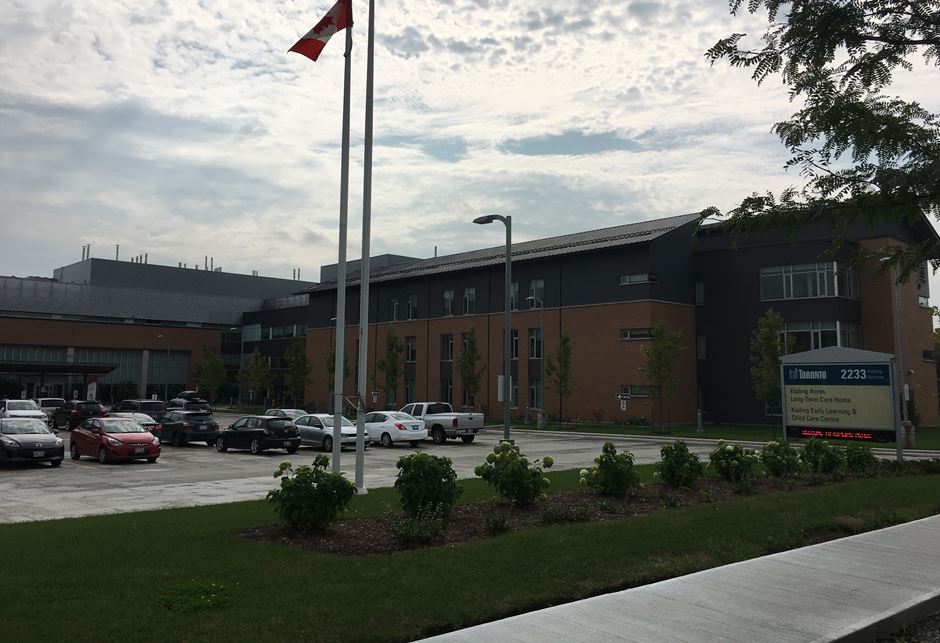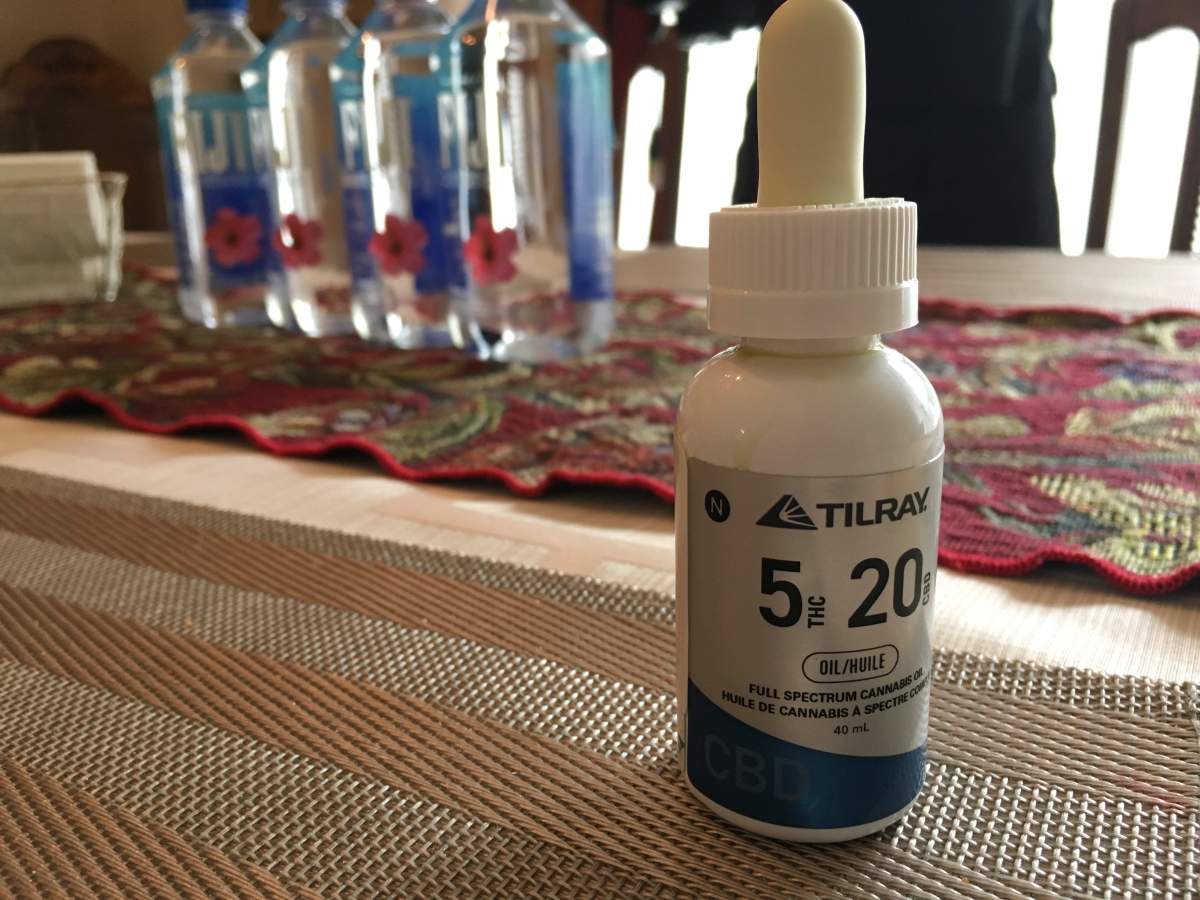Linda Moreal believes medical cannabis changed her mother’s life.

Before Maria Moreal, 87, began taking medicinal cannabis for her chronic pain, she had been taking Percocets daily for eight years. Five years ago, her family doctor started her on morphine as well, which she’s been taking every day since.
Since starting on medical cannabis back in March, she’s reduced her intake of pills from four per day, down to two.
When it came time for the family to place Moreal in a long-term care facility however, Kipling Acres, a city of Toronto-owned facility denied her, citing her prescription for medicinal cannabis.
“First, it was very shocking, because it’s a prescribed medication,” said her daughter Linda. “Arbitrarily, this home just decided they can’t do this.”
But after questions from Global News, Kipling Acres reversed Moreal’s rejection.
“In an effort to avoid this situation from occurring in the future, all home administration staff will be reminded that an applicant’s prescription for cannabinoid oil is not a restriction to being admitted to a LTCHS home,” the facility said in a statement.
Degenerative discs in Moreal’s back mean she’s in constant pain, and simple movements have become more and more challenging. In addition, Moreal’s daughter Linda says her medication made her “dopey,” and depressed. She had almost entirely stopped eating.
Her family doctor referred her to Dr. Michael Verbora, the chief medical officer of the Toronto-based cannabis clinic Aleafia Total Health. He suggested starting Moreal on a small, daily dose of cannabinoid oil, just 1.5 millilitres per day.
Her family quickly began noticing improvements.
“It’s gradually decreased her dependency on the narcotics, so she was taking three, sometimes four pills a day. Now, she’s taking two, maybe three on really bad days,” explained Linda.

Get weekly health news
In addition, they soon discovered other beneficial side effects of cannabis as well.
“The cannabinoid oil has alleviated some of that pain, but more importantly, it’s really enhanced her mood,” said Linda. “Before, I found she was chronically depressed, and her dementia was getting worse, quickly.”
“Her family reported that she slowly starting to reduce her opiates. It sounds like there’s been a between 20 and 40 per cent reduction already, in just one or two months,” said Verbora.
“She’s actually feeling substantially better, and there are a lot of side benefits. There’s a lot of sleep benefits and mood benefits since she’s been using this product, and this is still the early stages,” he explained.
Medicinal cannabis has been legal in Canada, with every licensed physician in the country being able to prescribe, since 2001. Recreational cannabis is on track for legalization this coming October.
Because of this, Moreal’s family was surprised when one of the three home -care facilities they’d applied to rejected her application this past June solely due to her use of cannabinoid oil, as no one at the facility was willing to administer it.
According to Linda and Verbora, Moreal’s medication is consumed orally through a small vial three times per day. The administrator of the product needs to measure out 0.05 millilitres of the product, and deliver it to Moreal through an eye-dropper.
“If you were giving a cough syrup, or antibiotic in a liquid, it would be no different than giving the cannabis oil. It just comes in an oil, it comes with a syringe, it’s extremely easy to measure. You measure the dose, and let the patient swallow it,” said Verbora.
The family received no further communications from the home in regards to Moreal’s rejection for three months, despite Linda consistently asking for a written copy of the rejection letter.
WATCH: How medical cannabis saved this town’s economy

According to Verbora, cannabis is one of many herbal remedies that’s frequently used by care facilities and is approved by insurance companies for coverage. He explained that many of his patients have been admitted to care facilities upon providing a letter from him explaining the use of the drug.
“Usually, these people would reach out to me, ask for clarification. I would write letters to support the patient, I would answer any questions that the facility had. And then usually, what we find is that they would be agreeable to it, and amenable to their policies,” said Verbora.
“These types of facilities should already have these policies, rules and understandings and education in place. I can understand if an organization that’s not really entwined in the health-care system doesn’t understand anything, but for an organization run by the City of Toronto that has physicians and pharmacies involved, this is a bit upsetting,” he explained.
On Aug. 9, the family received an official letter of rejection from the facility claiming that Moreal was rejected from Kipling Acres because none of the home’s physicians were licensed to dispense cannabis.
But, all licensed physicians in Canada are legally allowed to prescribe cannabis to their patients, according to the Access to Cannabis for Medical Purposes Regulations.
WATCH: Cannabis retailers getting ready as recreational pot set to be legal in 2 months

On Monday afternoon, a representative from the home told Global News that Moreal was rejected because staff of the facility assumed the cannabinoid oil was to be smoked, rather than consumed orally as cannabinoid oil.
In the meantime, Moreal’s dementia continues to accelerate, making it more difficult for Linda and her partner to care for her at home.
“Right now, I can’t leave her home alone. I can’t leave her alone at night, we can’t go anywhere at night. It’s like leaving a toddler home by themselves. As I said, right now, she’s fine during the day if I have to leave to go to work. We would never think of going away for a weekend. And, it’s a progressive disease. We don’t know how quickly her dementia could change,” Linda explained.
Despite the home’s reversal of Moreal’s rejection, Verbora still harbours concerns about the stigma against medical cannabis across the country, and especially in the medical community.
“We look to them as experts. And we look to them as knowledgeable, informed, and to have the patient’s best interests at heart.”
WATCH: Medical marijuana users fear impaired-driving laws once cannabis is legal

There are currently almost 300,000 people registered with medicinal cannabis dispensaries across Canada, according to data from the Canadian government.
The Canadian Medical Association has cited ongoing concerns with the health impacts of medical cannabis, which they state can include anything from cardiovascular and pulmonary impacts to mental illness.
However, Verbora believes that cannabis can “work wonders” for the right patients, though there are still several barriers to educating the medical community on the benefits of cannabis in addition to the potential harms.
“Cannabis is such a disruptor. Some of the oldest systems are fearful of the revolution that’s coming.”
“There’s so many other industries and organizations that are built around existing things that aren’t necessarily people and patients’ best interest that they’re doing everything they can to maintain the status quo.”
However, Verbora is insistent that physicians comfortable with using cannabis for medical purposes need to act as advocates for their patients’ access to a product that may change their lives.
“The truth will eventually prevail,” he resolves.



_848x480_1307493955592.jpg?w=1200&quality=70&strip=all)












Comments